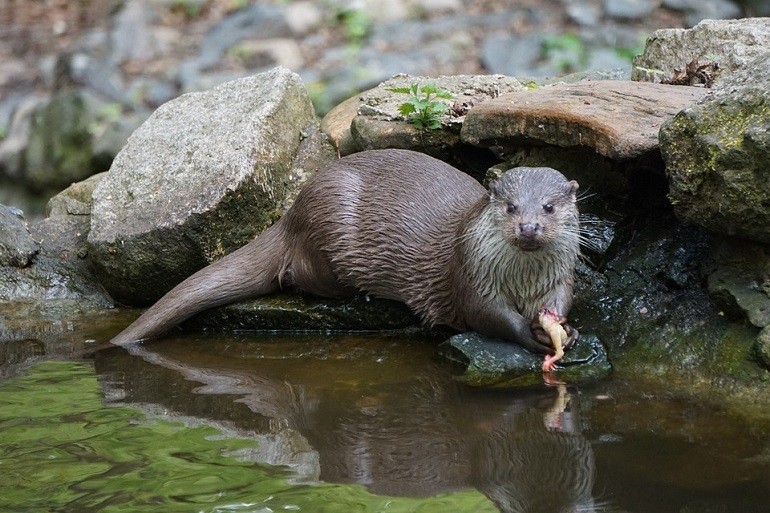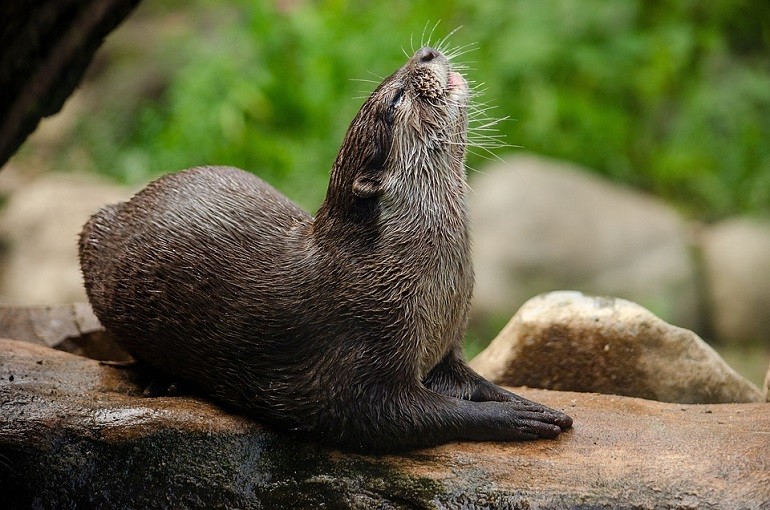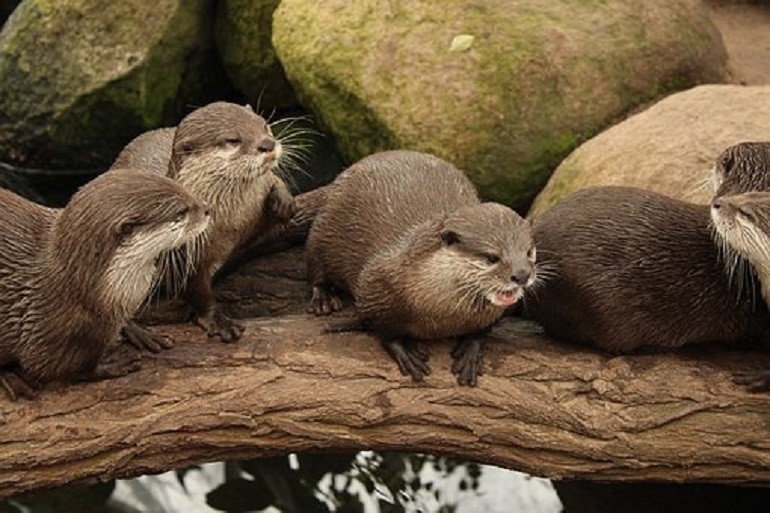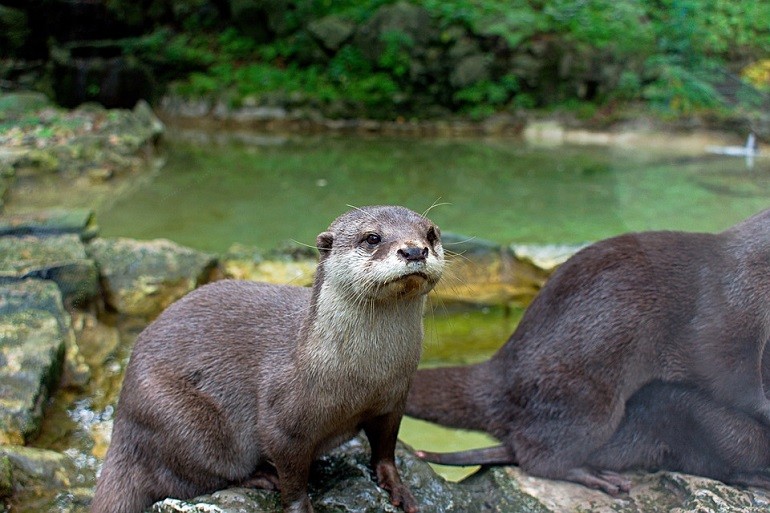How Much Does A Pet Otter Cost? This is a fascinating question that PETS.EDU.VN aims to answer comprehensively, providing clarity for those considering otter ownership and offering valuable insights into the responsibilities involved. Discover the financial aspects, legal considerations, and ethical implications of owning an otter, ensuring you’re well-informed. Dive in to explore alternative exotic pets, otter behavior, responsible pet ownership and other key factors.
1. The Allure of Pet Otters: Why Are They So Desirable?
Otters, with their playful antics and endearing appearance, often top the list of dream pets. Their aquatic grace and social nature captivate animal lovers, but before diving into otter ownership, it’s essential to understand the realities involved. These unique creatures have specific needs that must be met to ensure their well-being.
2. Understanding Otter Species: River vs. Sea Otters
There are about 13 different species of otters, divided into two primary groups: river otters and sea otters. River otters belong to the Lutra genus, while sea otters are part of the Enhydra genus. Knowing the differences between these groups is crucial when considering keeping an otter as a pet.
2.1 River Otters:
River otters are typically found in freshwater habitats, such as rivers, lakes, and streams. Some popular river otter species include:
- Asian Small-Clawed Otter (Aonyx cinerea): Known for their small size and playful nature.
- North American River Otter (Lontra canadensis): Native to North America, these otters are highly adaptable.
- Eurasian Otter (Lutra lutra): Found across Europe and Asia, these otters are skilled swimmers and hunters.
2.2 Sea Otters:
Sea otters, on the other hand, live in marine environments, primarily along the coasts of the North Pacific Ocean. They are well-adapted to cold waters and have unique behaviors for survival.
- Sea Otter (Enhydra lutris): These otters are the smallest marine mammals in North America and have the densest fur of any animal.
3. The Financial Commitment: How Much Does a Pet Otter Cost?
The initial cost of acquiring an otter is just the tip of the iceberg. The long-term expenses associated with their care can be substantial.
3.1 Initial Purchase Price:
On average, acquiring a pet otter can range from $3,000 to $5,000 in the United States. This figure doesn’t include transportation costs or potential legal fees associated with obtaining permits.
3.2 Housing Costs:
Otters require a large, secure enclosure that mimics their natural habitat. This includes a spacious area for land activity and a pool deep enough for diving and swimming.
- Enclosure Construction: Building a suitable enclosure can cost between $2,000 and $10,000, depending on the size and complexity.
- Pool Installation: A custom-built pool can add another $1,000 to $5,000 to the initial costs.
3.3 Dietary Expenses:
Otters have a specialized diet that includes live crayfish, fish, and low-pH cat food. Feeding an otter can be quite expensive.
- Daily Food Costs: Expect to spend $10 to $30 per day on food, which translates to $300 to $900 per month.
- Specialized Supplements: Adding necessary vitamins and supplements can increase monthly costs by $50 to $100.
3.4 Veterinary Care:
Regular veterinary check-ups and vaccinations are essential for maintaining an otter’s health.
- Annual Check-Ups: Veterinary visits can cost between $200 and $500 per year.
- Vaccinations and Preventative Care: Additional costs for vaccinations and parasite prevention can range from $100 to $300 annually.
- Emergency Care: Unexpected illnesses or injuries can lead to significant veterinary bills, potentially costing thousands of dollars.
3.5 Enrichment and Toys:
Otters are intelligent and active animals that require plenty of mental and physical stimulation.
- Toys and Activities: Providing a variety of toys, such as treat-dispensing puzzles and floating objects, can cost $50 to $150 per month.
- Habitat Enrichment: Adding natural elements like rocks, logs, and plants to their enclosure can also add to the monthly expenses.
3.6 Other Costs:
Miscellaneous expenses can also add up over time.
- Utilities: Maintaining a suitable water temperature for their pool may increase electricity or gas bills.
- Cleaning Supplies: Keeping their enclosure clean requires specialized cleaning products.
- Insurance: Exotic pet insurance can help cover unexpected veterinary costs, but it comes with a monthly premium.
4. Legal Considerations: Where Can You Legally Own an Otter?
Before acquiring an otter, it’s crucial to understand the legalities of owning one in your area. Many countries and states have strict regulations regarding exotic pet ownership.
4.1 United States:
In the U.S., regulations vary by state. Sea otters are protected under the Marine Mammal Protection Act, making it illegal to own them nationwide. River otter ownership is permitted in some states, provided you have the necessary licenses and permits.
States Where Pet Otters Are Possibly Legal:
| State | Regulations |
|---|---|
| Florida | Requires a permit for specific otter species. |
| Indiana | Allows otter ownership with proper permits. |
| Michigan | Permits may be required; check local ordinances. |
| Minnesota | Otter ownership allowed with specific licenses. |
| Mississippi | Regulations vary; consult local wildlife officials. |
| Missouri | Requires permits for exotic animal ownership, including otters. |
| Nebraska | Otter ownership permitted with necessary permits. |
| Nevada | Check local ordinances and state regulations for otter ownership. |
| New York | Permits required for certain exotic animals, including otters. |
| North Carolina | Regulations vary; check with the state wildlife agency. |
| North Dakota | Allows otter ownership with proper permits and licenses. |
| Ohio | Restrictions apply; contact the Department of Natural Resources. |
| Oklahoma | Requires permits for exotic animal ownership, including otters. |
| South Dakota | Otter ownership permitted with necessary permits and licenses. |
| Tennessee | Allows otter ownership with proper permits; restrictions may apply. |




4.2 United Kingdom:
Owning a pet otter is illegal in the UK due to conservation concerns and the protection of native otter populations.
4.3 Japan:
While otters have gained popularity as pets in Japan, owning them is becoming increasingly regulated due to concerns about illegal wildlife trade and conservation.
4.4 Other Countries:
Many other countries have similar regulations in place to protect otter populations and prevent illegal pet trade. Always consult with local wildlife authorities to understand the specific laws in your area.
5. Ethical Considerations: Is It Right to Keep an Otter as a Pet?
Beyond the financial and legal aspects, there are important ethical considerations to ponder before deciding to keep an otter as a pet.
5.1 Conservation Concerns:
The demand for pet otters, particularly Asian small-clawed otters, has led to a decline in their wild populations. Capturing otters for the pet trade often involves killing adult otters to take their cubs, which is detrimental to the species’ survival.
5.2 Welfare of the Animal:
Otters are social animals that thrive in family groups and require large territories to forage and explore. Confining them to a domestic environment can cause stress, anxiety, and behavioral problems.
5.3 Meeting Their Needs:
Providing an appropriate environment and diet for an otter is challenging and requires specialized knowledge and resources. Most pet owners are unable to meet the complex needs of these animals, leading to compromised welfare.
6. The Realities of Otter Ownership: Challenges and Difficulties
While otters may seem like charming and playful pets, owning them comes with numerous challenges and difficulties.
6.1 Aggressive Behavior:
Otters are wild animals with natural instincts that can manifest as aggression, especially when they feel threatened or stressed. They may bite, scratch, or exhibit destructive behaviors.
6.2 Messy Habits:
Otters are not easily house-trained and tend to mark their territory with strong-smelling feces. Cleaning up after them can be a constant and unpleasant task.
6.3 Noisy Communication:
Otters communicate through a variety of vocalizations, including squeaks, growls, chirps, and screams. These noises can be disruptive, especially in urban environments.
6.4 Distinctive Odor:
Otters have scent glands all over their bodies and use them to mark their surroundings. Their scent is often described as fishy and unpleasant, which can make them less desirable as indoor pets.
6.5 Need for Social Interaction:
Otters are social animals that naturally live in family groups. When kept alone, they can suffer from loneliness and boredom, leading to behavioral problems.
7. Alternative Exotic Pets: Exploring Other Options
If you’re drawn to exotic animals but concerned about the welfare and ethical implications of owning an otter, consider some alternative pets that are more suitable for domestic life.
7.1 Ferrets:
Ferrets are playful and intelligent animals that can make great companions. They are legal to own in most states and can be trained to use a litter box.
7.2 Sugar Gliders:
Sugar gliders are small, arboreal marsupials that are known for their gliding ability. They are social animals that thrive in pairs and require a specialized diet and environment.
7.3 Hedgehogs:
Hedgehogs are solitary creatures that are relatively easy to care for. They require a quiet environment and a diet of insects and specialized hedgehog food.
7.4 Certain Reptiles:
Some reptiles, such as bearded dragons and leopard geckos, can make good pets for experienced reptile owners. They require specific temperature and humidity levels but are generally low-maintenance.
8. Caring for a Pet Otter: A Detailed Guide
If you’re still determined to keep an otter as a pet, it’s essential to understand the specific care requirements.
8.1 Housing:
- Enclosure Size: A suitable enclosure should be at least 60 square meters with secure fencing.
- Water Access: A pool deep enough for diving and swimming is essential. The water should be clean and regularly changed.
- Climbing and Digging: Otters are skilled climbers and diggers, so the enclosure must be secure to prevent escapes.
8.2 Diet:
- Variety: Otters need a varied diet that includes live crayfish, fish, insects, and commercial otter food.
- Supplements: Vitamin and mineral supplements are necessary to ensure they get all the nutrients they need.
- Feeding Schedule: Otters need to be fed multiple times a day to meet their high energy requirements.
8.3 Enrichment:
- Toys: Provide a variety of toys, such as treat-dispensing puzzles and floating objects, to keep them mentally stimulated.
- Social Interaction: If possible, keep otters in pairs or small groups to meet their social needs.
- Exploration: Regularly change their environment to provide new experiences and prevent boredom.
8.4 Health:
- Veterinary Care: Regular check-ups and vaccinations are essential. Find a veterinarian experienced in treating exotic animals.
- Hygiene: Keep their enclosure clean to prevent the spread of disease.
- Parasite Prevention: Regularly treat them for parasites, such as fleas, ticks, and worms.
9. The Otter’s Natural Habitat: A Glimpse into Their Wild World
Understanding the natural habitat and behaviors of otters can provide valuable insights into their needs as pets.
9.1 Habitat:
Otters live in a variety of aquatic habitats, including rivers, lakes, coastal waters, and wetlands. They are well-adapted to swimming and diving and spend much of their time in the water.
9.2 Behavior:
Otters are social animals that live in family groups called “romps.” They are active hunters and playful creatures, often seen sliding down riverbanks or playing with objects in the water.
9.3 Diet:
In the wild, otters eat a variety of prey, including fish, crustaceans, mollusks, amphibians, and birds. They are opportunistic feeders and will eat whatever is available.
9.4 Threats:
Otters face a number of threats in the wild, including habitat loss, pollution, hunting, and the illegal pet trade. Conservation efforts are essential to protect their populations.
10. Conservation Efforts: How You Can Help Protect Otters
If you care about otters, there are many ways you can help protect them in the wild.
10.1 Support Conservation Organizations:
Donate to or volunteer with organizations that work to protect otter habitats and combat illegal wildlife trade.
10.2 Reduce Your Environmental Impact:
Practice sustainable living by reducing your use of resources, avoiding pollutants, and supporting eco-friendly products.
10.3 Educate Others:
Share information about the threats facing otters and encourage others to take action.
10.4 Advocate for Stronger Regulations:
Support laws and policies that protect otters and their habitats.
FAQ’s
How Much Does a Pet Otter Cost?
The initial cost of a pet otter ranges from $3,000 to $5,000, not including ongoing expenses like housing, food, and veterinary care.
What Legal Pets are Like Otters?
Legal alternatives to otters include ferrets, sugar gliders, hedgehogs, and certain reptiles like bearded dragons and leopard geckos.
Do Asian Otters Make Good Pets?
Asian otters do not make good pets due to their complex needs, potential for aggression, and the ethical concerns surrounding their capture from the wild.
Where Can I Buy a Pet Otter?
Finding a pet otter is difficult and often involves joining a long waiting list with specialized breeders or brokers. However, due to their vulnerable status in the wild, it’s crucial to ensure any purchase is ethical and legal.
What is the Lifespan of a Pet Otter?
Pet otters can live up to 20 years with proper care, which is longer than their wild counterparts who typically live between 10 to 15 years.
What Do Pet Otters Eat?
Pet otters require a specialized diet consisting of live crayfish, fish, and low-pH cat food, supplemented with vitamins and minerals.
How Big Do Pet Otters Get?
The size of pet otters varies depending on the species. Asian small-clawed otters, the smallest species, grow to about two feet in length, including their tail.
Are Pet Otters Dangerous?
Yes, pet otters can be dangerous. They are wild animals with natural instincts that can lead to aggressive behavior, especially when stressed or threatened.
What Kind of Enclosure Do Pet Otters Need?
Pet otters need a large, secure enclosure that includes a spacious area for land activity and a pool deep enough for diving and swimming. The enclosure should be at least 60 square meters with secure fencing.
How Often Do Pet Otters Need Veterinary Care?
Pet otters need regular veterinary check-ups, vaccinations, and parasite prevention. Annual check-ups are essential, and you should find a veterinarian experienced in treating exotic animals.
Conclusion
While the idea of owning a pet otter may seem appealing, the reality is that these animals are not well-suited for domestic life. They require specialized care, a significant financial investment, and raise important ethical concerns. By understanding the challenges and considering the alternatives, you can make an informed decision that prioritizes the welfare of these fascinating creatures. Remember, PETS.EDU.VN is here to provide you with the information you need to make responsible pet ownership choices.
If you’re passionate about animals and want to make a positive impact, consider supporting conservation efforts or adopting a pet that is better suited for domestic life. Visit PETS.EDU.VN for more information and resources on responsible pet ownership and animal welfare.
For further inquiries, you can reach us at:
Address: 789 Paw Lane, Petville, CA 91234, United States
Whatsapp: +1 555-987-6543
Website: pets.edu.vn
